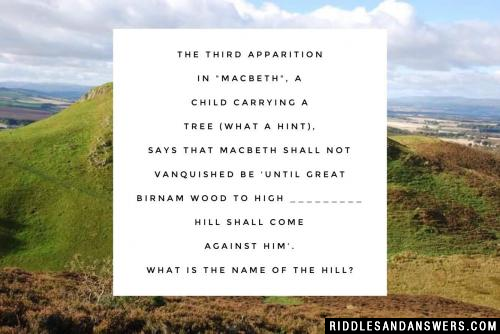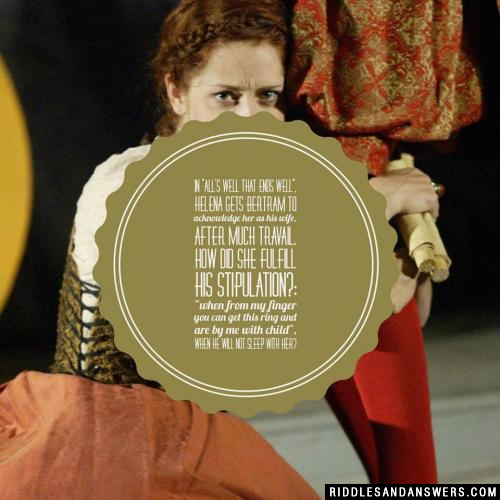Trending Tags
Feel free to use content on this page for your website or blog, we only ask that you reference content back to us. Use the following code to link this page:
Search Suggestions
Trouble finding ? Here are some search terms related to to try browsing:
Terms · Privacy · Contact
Riddles and Answers © 2021
The Favorite Daughter
King Lear tests his daughters' love by the strength of their protestations. What a foolish fond old man!
Goneril says amongst other things that Lear is 'dearer than eyesight, space and liberty'. Regan professes that she is 'an enemy to all other joys'. Cordelia the favorite daughter is tongue-tied and she offers one word only '________'.
Fill in the blank.
Goneril says amongst other things that Lear is 'dearer than eyesight, space and liberty'. Regan professes that she is 'an enemy to all other joys'. Cordelia the favorite daughter is tongue-tied and she offers one word only '________'.
Fill in the blank.
Hint:
Nothing.
Your Answer: love
The correct answer was Nothing
Other accepted answers: nothing
"Nothing will come of nothing, speak again". Lear really wants her to try again but she counters that she cannot "heave my heart into my mouth" and also doubts her sisters sincerity, "Why have my sisters husbands, if they say they love you all? ". Lear cannot believe her lack of warmth "so young and so untender". Cordelia counters "so young, my lord, and true". Did you answer this riddle correctly?
YES NO
Your Answer: love
The correct answer was Nothing
Other accepted answers: nothing
"Nothing will come of nothing, speak again". Lear really wants her to try again but she counters that she cannot "heave my heart into my mouth" and also doubts her sisters sincerity, "Why have my sisters husbands, if they say they love you all? ". Lear cannot believe her lack of warmth "so young and so untender". Cordelia counters "so young, my lord, and true". Did you answer this riddle correctly?
YES NO
Great Birnam Wood Riddle
The third apparition in "Macbeth", a child carrying a tree (what a hint), says that Macbeth shall not vanquished be 'until Great Birnam wood to high _________ hill shall come against him'.
What is the name of the hill?
What is the name of the hill?
Hint:
Dunsinane
Macduff and the opposing forces camouflage themselves with branches from Birnam Forest. Dunsinane is a peak of the Sidlaw Hills, in the parish of Collace, Perthshire, Scotland, 8 m. N.E. of Perth. It is 1012 ft. high, and commands a fine view of the Carse of Gowrie and the valley of the Tay. Its chief claim is due to the association with Birnam Wood (about 12 m. N.W.) in these passages in Macbeth. An old fort on the summit, of which faint traces are still discernible, is traditionally called Macbeth's Castle. Did you answer this riddle correctly?
YES NO
Macduff and the opposing forces camouflage themselves with branches from Birnam Forest. Dunsinane is a peak of the Sidlaw Hills, in the parish of Collace, Perthshire, Scotland, 8 m. N.E. of Perth. It is 1012 ft. high, and commands a fine view of the Carse of Gowrie and the valley of the Tay. Its chief claim is due to the association with Birnam Wood (about 12 m. N.W.) in these passages in Macbeth. An old fort on the summit, of which faint traces are still discernible, is traditionally called Macbeth's Castle. Did you answer this riddle correctly?
YES NO
The Bloody Child Riddle
The second apparition in "Macbeth", the bloody child, recommends 'be bloody, bold and resolute, laugh to scorn the power of man, for none of woman born shall harm Macbeth'. How was the Thane of Fife able to kill Macbeth in the light of this prophecy?
Hint:
His mother had a Caesarean.
A bit of a quibble really but those apparitions did not play fair; Macduff was from his mother's womb untimely ripped. Presumably this was an early Caesarean. Did you answer this riddle correctly?
YES NO
A bit of a quibble really but those apparitions did not play fair; Macduff was from his mother's womb untimely ripped. Presumably this was an early Caesarean. Did you answer this riddle correctly?
YES NO
The Thane Of Fife Riddle
Macbeth is given three pieces of oracular information by the apparitions. The first apparition, an armed head, states 'beware _____, beware the Thane of Fife'. Who was the Thane of Fife? (He had a wife).
Hint:
The answer is Macduff. Only the first apparition answers straightforwardly. Macbeth should have taken notice of such specific information. The other two apparitions present riddles, where the answer is not what it seems. Did you answer this riddle correctly?
YES NO
YES NO
Fulfilling Her Stipulation
In "All's Well that Ends Well", Helena gets Bertram to acknowledge her as his wife, after much travail. How did she fulfill his stipulation?:
"When from my finger you can get this ring and are by me with child", when he will not sleep with her?
"When from my finger you can get this ring and are by me with child", when he will not sleep with her?
Hint:
Adriano De Armado's Servant Riddle
Moth, Adriano de Armado's servant in "Loves Labours Lost", riddles with his foolish master. He will carry the message:
"ADRIANO DE ARMADO: The way is but short: away!
MOTH: As swift as ____, sir."
What is missing?
"ADRIANO DE ARMADO: The way is but short: away!
MOTH: As swift as ____, sir."
What is missing?
Hint:
The Actions Of Pericles
Pericles must answer Antiochus' riddle to win the hand of his daughter. If he fails he will face death. The riddle is:
"I am no viper, yet I feed
On mother's flesh which did me breed.
I sought a husband, in which labour
I found that kindness in a father:
He's father, son, and husband mild;
I mother, wife, and yet his child.
How they may be, and yet in two,
As you will live, resolve it you."
What does Pericles do?
"I am no viper, yet I feed
On mother's flesh which did me breed.
I sought a husband, in which labour
I found that kindness in a father:
He's father, son, and husband mild;
I mother, wife, and yet his child.
How they may be, and yet in two,
As you will live, resolve it you."
What does Pericles do?
Hint:
Understands the riddle to mean incest and hints to Antiochus his understanding.
Antiochus realises from Pericles' hints that Pericles has understood the riddle and determines to have him killed. I am not aware of any other reference to incest in Shakespeare. Incest seems to retain its rightful shock value much more in Shakespeare and the classics. Did you answer this riddle correctly?
YES NO
Antiochus realises from Pericles' hints that Pericles has understood the riddle and determines to have him killed. I am not aware of any other reference to incest in Shakespeare. Incest seems to retain its rightful shock value much more in Shakespeare and the classics. Did you answer this riddle correctly?
YES NO
Portia's Favored Suitor
Hint:
The Prince Of Arragon
The Prince of Arragon is one suitor to Portia, prepared to risk his dignity in the trial by Caskets. What does his choice of casket contain, actually and metaphorically?
Hint:
All of these
The silver casket is said to bring the chooser 'as much as he deserves', which turns out to be The Portrait of a Blinking Idiot.
The schedule reads (extract)
"Take what wife you will to bed,
I will ever be your head:
So be gone: you are sped.
Still more fool I shall appear
By the time I linger here
With one fool's head I came to woo,
But I go away with two." Did you answer this riddle correctly?
YES NO
The silver casket is said to bring the chooser 'as much as he deserves', which turns out to be The Portrait of a Blinking Idiot.
The schedule reads (extract)
"Take what wife you will to bed,
I will ever be your head:
So be gone: you are sped.
Still more fool I shall appear
By the time I linger here
With one fool's head I came to woo,
But I go away with two." Did you answer this riddle correctly?
YES NO
A Suitor To Portia Riddle
The casket scene in "The Merchant of Venice" contains several riddles. Which of these nobles was NOT a suitor to Portia? This odd-man-out noble might easily be confused with the contender who chose 'Who chooseth me shall gain what many men desire.'
Hint:
Signing Off M, O, A
Hint:
The Merchant Of Venice
How does Nerissa describe the trial of the caskets in "The Merchant of Venice"?
Fill in the gap. "NERISSA: Your father was ever virtuous; and holy men at their death have good inspirations: therefore ___ _______, that he hath devised in these three chests of gold, silver and lead, whereof who chooses his meaning chooses you, will, no doubt, never be chosen by any rightly but one who shall rightly love."
Fill in the gap. "NERISSA: Your father was ever virtuous; and holy men at their death have good inspirations: therefore ___ _______, that he hath devised in these three chests of gold, silver and lead, whereof who chooses his meaning chooses you, will, no doubt, never be chosen by any rightly but one who shall rightly love."
Hint:
The Twelfth Night Riddle
Hint:
A Lucrece Knife Riddle
"I may command where I adore;
But silence, like a Lucrece knife,
With bloodless stroke my heart doth gore:
M, O, A, I, doth sway my life."
This riddle is dropped in the way of whom, as part of a trap?
But silence, like a Lucrece knife,
With bloodless stroke my heart doth gore:
M, O, A, I, doth sway my life."
This riddle is dropped in the way of whom, as part of a trap?
Hint:
Making Dirty Money
Im to make dirty money youll probably wash;
Im put over your shoes like a snow-day galosh;
The loud clamorous noise you might hear at a mosh;
And the hand-held equipment for tennis or squash.
Who am I?
Im put over your shoes like a snow-day galosh;
The loud clamorous noise you might hear at a mosh;
And the hand-held equipment for tennis or squash.
Who am I?
Hint:
Post Your Shakespeare Riddles Below
Can you come up with a cool, funny or clever Shakespeare Riddles of your own? Post it below (without the answer) to see if you can stump our users.

